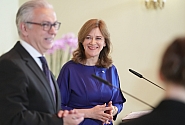
Today, 15 May, the Monitoring Committee of the Parliamentary Assembly of the Council of Europe (PACE) begins its work in Riga under the chairmanship of Zanda Kalniņa-Lukaševica, Deputy Speaker of the Saeima. As part of the session, the President of the Assembly, Theodoros Rousopoulos, is visiting Latvia.
Opening the Riga session of the Monitoring Committee, Kalniņa-Lukaševica stressed, during a press briefing, the often-underestimated threats to democratic processes in Latvia and the vital role of the Assembly in strengthening democracy.
“The Assembly is not the loudest of organisations, but it is precisely here that decisions are made which become the basis for action. On the basis of our work, the Register of Damage has been established to document the losses inflicted on Ukraine by Russian aggression. On the basis of our resolutions, a tribunal has been created to investigate crimes of aggression committed by Russia. And yesterday, as a result of this intensive work, a final decision was adopted,” said the Chair of the Monitoring Committee.
She emphasised that one of the most dangerous global threats today is foreign interference—sophisticated, technologically advanced, and often difficult to detect—aimed at eroding trust, dividing societies, and weakening institutions in the interest of third-country strategic agendas, most notably those of Russia, Iran, and China.
“Artificial intelligence, algorithms, and disinformation are being deployed. Lies are being made to appear as truth. This is not a plurality of opinions—it is a systemic influence operation. These are not abstract risks. It is happening all across Europe, including here in Latvia. Russia is currently mounting a sharp attack against democracies. This is a full-scale assault on democratic institutions with the aim of gaining control, lifting sanctions, recovering frozen assets, and expanding its ability to trade in gas and oil,” Kalniņa-Lukaševica warned.
She also drew attention to attempts within Latvia to use various instruments to undermine societal unity, diminish support for Ukraine, and normalise cooperation with the aggressor state—Russia.
“I believe there are receptive ears even here in Latvia—there are those who prefer trade with Russia over arming Ukraine. There are voices more concerned with cooperating with the aggressor than with defending against it. Russia’s goal is not only victory on the battlefield. Its goal is to shape our political discourse, weaken our unity, and influence public opinion. This is the assault of an authoritarian regime on democracies,” Kalniņa-Lukaševica stressed.
Meanwhile, during his visit to the Saeima, Assembly President Rousopoulos underscored the shared commitment of Latvia and the Council of Europe to strengthening democracy, the rule of law, and human rights across Europe. He recalled that citizens in Council of Europe member states benefit daily from human rights protections, such as those provided by the European Convention on Human Rights and other key legal instruments.
As previously announced, the PACE session in Riga on 15–16 May brings together over 30 parliamentarians from across Europe, including Claire Bazy Malaurie, President of the Venice Commission.
The committee’s agenda includes evaluating the situation in Georgia, Hungary, Türkiye, Moldova, Serbia, Bosnia and Herzegovina, and Albania. European parliamentarians will also discuss strengthening response mechanisms to more effectively prevent potential conflicts or the erosion of democracy.
Photo: https://www.flickr.com/photos/saeima/albums/72177720326147489
Disclaimer & copyright: https://www.saeima.lv/en/copyright
Saeima Press Service







